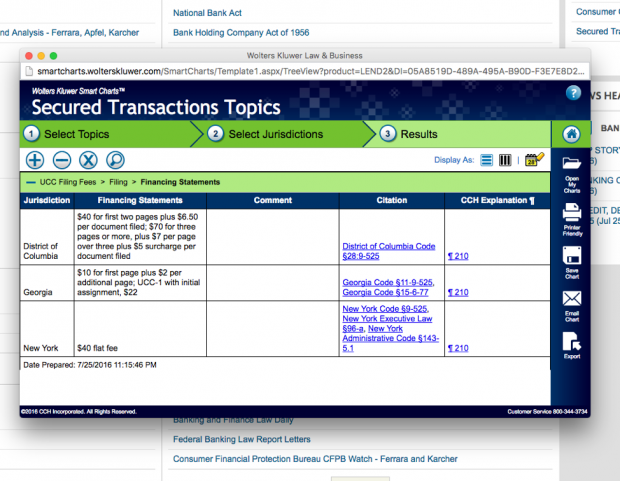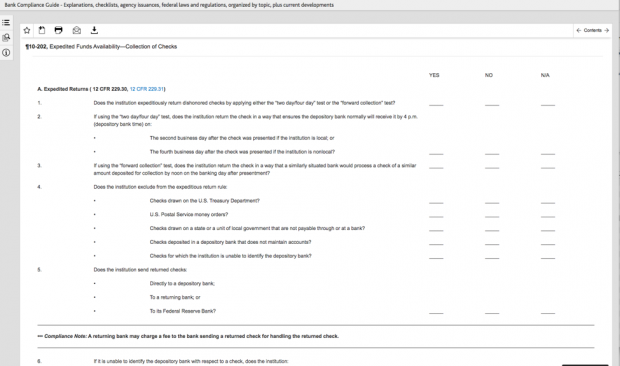 As one of the few practicing transactional attorneys here at Above the Law, I occasionally get asked to take the latest corporate law tools out for a test drive. Last weekend I tested an online tool named Cheetah, a new product being rolled out by Wolters Kluwer. Cheetah is focused on banking and consumer finance law. Whereas in my primary field of securities law there are just four relevant acts at the federal level, banking and consumer finance is broad enough that it’s a real challenge to keep enough books on your shelf so every topic is covered, or to bookmark all the relevant websites. A tool like Cheetah can be a real game-changer — if it’s easy to use, that is.
As one of the few practicing transactional attorneys here at Above the Law, I occasionally get asked to take the latest corporate law tools out for a test drive. Last weekend I tested an online tool named Cheetah, a new product being rolled out by Wolters Kluwer. Cheetah is focused on banking and consumer finance law. Whereas in my primary field of securities law there are just four relevant acts at the federal level, banking and consumer finance is broad enough that it’s a real challenge to keep enough books on your shelf so every topic is covered, or to bookmark all the relevant websites. A tool like Cheetah can be a real game-changer — if it’s easy to use, that is.
So is it?
It is. The first thing I noticed about Cheetah, other than the fact it shares its name with a certain ballet company in Atlanta, was the commonsense layout. Some sites (here’s looking at you, TheCorporateCounsel.net) are way too junky, and it can be difficult to find particular items. Other sites are a bit too spare, so you have to memorize which items are located in the particular categories (because there are always subjects that straddle categories). But Cheetah strikes a nice balance, with eleven topics laid out, and hyperlinks of the three to five most relevant subjects beneath each one. It really works. The eleven topics take up the first and second columns, with the third column consisting of practice tools and news headlines (click to enlarge):

Skills That Set Firms Apart
Legal expertise alone isn’t enough. Today’s most successful firms invest in developing the skills that drive collaboration, leadership, and business growth. Our on-demand, customizable training modules deliver practical, high-impact learning for attorneys and staff—when and where they need it.
I’ll briefly touch on some of the individual features of the product.
The Bank Digest section, under the News & Blogs topic headline, gives you all the latest news in the banking industry, from relevant GAO reports to OFAC sanctions. Any news that touches the banking industry is provided, even news from some sources I wouldn’t think of as generating relevant content, such as the Federal Trade Commission. In addition, Cheetah features every kind of banking law reporter you would ever need. You can quickly access the Federal Banking Law Reporter – Wolters Kluwer’s proprietary guide to the federal regulation of banks and thrifts – as well as the banking law reporter of any state, the Consumer Financial Protection Bureau Reporter, and every other type of reporter you can shake a stick at.
Cheetah is an easy way to quickly find the most relevant laws. All the rules and regulations are publicly available on the internet in various locations, but it can be a pain having to earmark a lot of different sites of varying search capabilities. It definitely helps having everything in one place, where you can search across the different primary sources for the most relevant information. Cheetah also offers various newsletters and treatise notifications you can sign up for, if you feel like you don’t get enough emails.

Meet Me At ILTACON: Opus 2 And AI Workbench
Swing by Booth 800 for a look at the latest in AI-powered case management.
I would think that if you work in-house, the digest and reporter features would be particularly helpful, since you might not be part of a larger practice group constantly feeding you information.
Clicking around the site and running various searches, I found that there is a lot of good, easily digestible general information for junior associates needing to get up to speed on overall banking law, or for more senior banking lawyers just needing a quick touch-up in a particular area. See the below result for “purchase money security interest”:
(However, none of the general-information pages give the date they were last updated. I always like to be able to see when a page was last updated, so I see this as a potential area for improvement.)
Cheetah has a feature named “Smart Charts,” which allows the user to easily compare the laws and regulatory procedures in various jurisdictions. Here I was able to bring up a chart of the fees and regulations regarding filing a UCC statement in three separate jurisdictions. Smart Charts is somewhat reminiscent of Practical Law Company’s state comparison tools, though I suppose there are only so many ways you can do a comparison chart:
The showstopper (in a good way) is the compliance information, specifically the guides. They are the best I’ve seen. The various guides – and there are several – thankfully eschew the “kitchen sink” approach of having 40 pages or so of bracketed text, which can be laborious to go through, and instead offer guides you can use with minimal revisions. The Cheetah compliance guides offer a useful starting point, and I’m willing to bet that even senior banking or compliance attorneys will find these useful, and they also include various examiner’s guides. In my eyes, the guides and other compliance information provide everything you need to get a compliance program off the ground, whether you are in-house or at a law firm. Note the compliance guides can be downloaded to pdf or rtf.
I won’t go on to describe every single thing that Cheetah has to offer, but I do want to mention that Cheetah also offers guides to federal and state credit laws and regulations, federal money laundering regulation, financial privacy law, and individual retirement plans.
In addition to being able to “favorite” pages, you can also save bookmarks to a particular “Worklist,” a feature that I found useful. If you’re working on two or more projects simultaneously, it’s useful to be able to pin different pages or entries to a particular worklist. Again, maybe not the most original feature (though the way I described it makes it sound more like Pinterest than it actually is), but the ease of use is notable. So if you’re thinking you’re too old for some newfangled device, note this could be something even you can use.
Cheetah is not just for corporate lawyers like myself. There is also an interesting resource named Bank Directors’, Officers’, and Lawyers’ Civil Liabilities, which is a collection of recent cases, with a one-paragraph analysis of each case and what that case might mean for participants in the field:
In general, I think it is a benefit to have a tool that is focused on the banking and consumer finance law practice areas. Practice tools that are too broad end up being no more useful than a Google search. Obviously, there can be some situations in which this is a drawback. Back in the day, I used to do a lot of “3(a)(2) bank note” offerings, and though 3(a)(2) is a Securities Act of 1933 registration exemption, I thought it would be included here, especially since in the advert there is a reference to securities activities of banks, but it wasn’t. Cheetah doesn’t provide the user with any kind of alert letting the user know a certain search term is out of its scope, so you could spend a few minutes thinking you’re typing in a word or phrase wrong, before finally realizing it’s not included in the scope of the tool.
That small quibble aside, for attorneys whose primary focus is banking or consumer credit, Cheetah is a useful arrow to have in your quiver.
Click for more information about Cheetah Banking and Consumer Finance Law.
Gary J. Ross opened his own practice, Jackson Ross PLLC, in 2013 after several years in Biglaw and the federal government. Gary handles corporate and securities matters for startups, large and small businesses, private equity funds, and investors in each, and also has a number of non-profit clients. You can reach Gary by email at [email protected].




